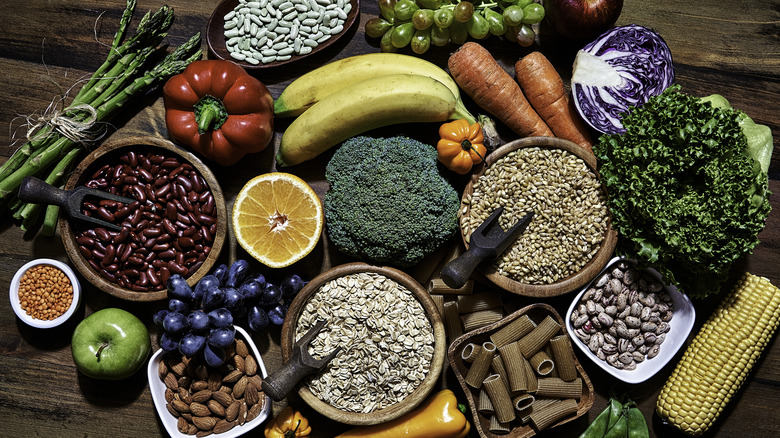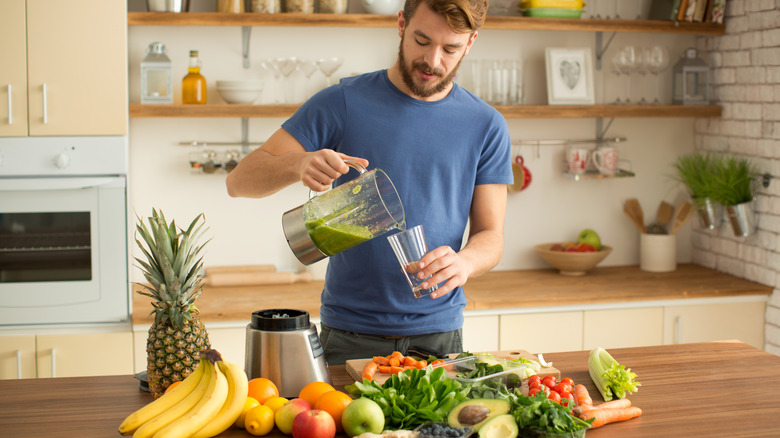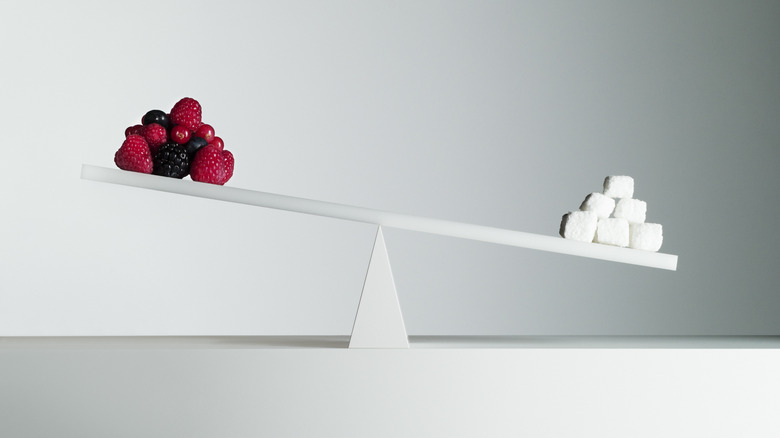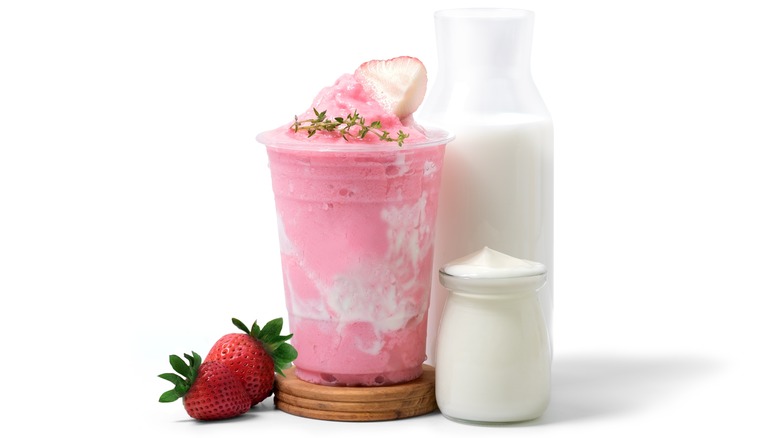What Happens To Your Body When You Drink A Smoothie Every Day
In the fast-paced rhythm of modern life, finding a nutritious and convenient solution to fuel your day can be challenging. Luckily, with their vibrant blend of flavors and nutrients, smoothies present themselves to the health-conscious and busy bee crowds with the answer they've been looking for. And as their popularity continues to rise, so does the curiosity surrounding the impact that consuming a daily smoothie can have on your body.
Smoothies offer a convenient and efficient way to pack a nutritional punch into your hectic schedule. With minimal preparation time, they effortlessly combine a variety of wholesome ingredients into a single, flavorful concoction that can serve as a quick breakfast, a post-workout refuel, or a refreshing snack (via PennState Extention). From tropical fruit blends to nutrient-dense green veggies, the world of smoothies is a playground for experimentation, and the simplicity of tossing your favorite ingredients into a blender and hitting the pulse button has turned smoothies into a versatile, time-saving, and customizable alternative for individuals committed to maintaining a healthy lifestyle. Popular types range from classic fruit smoothies to protein-based or trendy superfood-infused creations, each catering to different tastes and health goals.
So, whether you crave the sweetness of a berry medley or the earthiness of a kale and avocado blend, there's a smoothie recipe to suit every palate. Keep reading to explore the potential benefits of daily smoothie consumption and decide whether the habit of sipping into wellness is the road to a healthier you.
You'll add more fiber to your day
Embarking on a daily smoothie journey isn't just a flavorful adventure; it's also a strategic move toward increasing your daily fiber intake. Even though the human body can't break it down completely, dietary fiber plays a pivotal role in promoting good health and mitigating the risk of chronic diseases. Fortunately, the very ingredients that make up a delightful smoothie (aka fruits, vegetables, whole grains, nuts, and seeds) are rich sources of this essential nutrient, per the U.S. Department of Agriculture (USDA).
According to a study published in the American Journal of Lifestyle Medicine, recommendations from the Institute of Medicine (IOM) state that daily fiber intake should ideally fall within the range of 19 to 38 grams. However, American consumption surveys reveal a stark reality: a mere 5% of the population meets these recommendations. Per the study, inadequate fiber intake has become a public health concern, especially since fiber contributes to the reduction of various health conditions, including heart disease, gastrointestinal disorders, obesity, type 2 diabetes, and certain cancers. Thus, smoothies come as a convenient and delicious solution to address this nutritional gap.
Whether fresh, frozen, or canned, fruits and vegetables contribute significantly to dietary fiber intake (via the USDA), and if you add whole grains and seeds like oats or chia seeds to the mix, you've got yourself a tasty and fiber-rich lineup that will get you a step closer toward a healthier, more fiber-enriched lifestyle.
You'll increase your fruit and vegetable intake
Sipping on a daily smoothie is a savvy strategy to boost your daily intake of fruits and vegetables, two essential components of a healthy diet. According to the USDA's MyPlate, a go-to guide for healthy eating, the recommended amount of fruit you should consume per day is two cups, which can be in the form of fresh, frozen, canned, or 100% fruit juice. Likewise, vegetables should make up two and a half cups of your daily food intake, and these can be raw or cooked, fresh, frozen, canned, or dried.
But why the emphasis on fruits and vegetables? Per a review published in the Iranian Journal of Public Health, these colorful treasures are packed with dietary fiber, vitamins, and minerals, all of which contribute to overall well-being. In fact, the vibrant hues of fruits and veggies are not just for show, as they indicate the presence of antioxidants that neutralize harmful free radicals before they can wreak havoc on your health. Eating enough fruits and vegetables has also been linked to a reduced risk of chronic diseases, and they also help manage body weight.
Unfortunately, despite the growing awareness of their health benefits, many adults fall short of the recommended intake. Therefore, whether it's leafy greens like kale and spinach or vitamin C-rich berries and citrus fruits, the beauty of incorporating fruits and vegetables into your daily smoothie lies in bringing you closer to meeting your daily fruit and vegetable goals.
You'll boost your skin health
Aside from treating your taste buds, indulging in a daily smoothie can also give a radiant boost to your skin. Packed with antioxidant compounds like vitamin C, vitamin E, carotenoids, polyphenols, and phenolic acids, fruits and vegetables (the key ingredients in your smoothies) act as skin superheroes. This is because, per a review published in the Journal of the Academy of Nutrition and Dietetics, besides giving plant-based foods their distinctive colors, said compounds contribute to your skin's defense against free radicals, thus helping reduce inflammation and, with it, early signs of skin aging. Moreover, multiple studies have highlighted the positive connection between higher intakes of fruits and vegetables and improved skin health, with benefits extending across various aspects, including skin hydration, hyperpigmentation, wrinkles, reddening, collagen, and elasticity.
Plus, according to Medical News Today, adding more fruits and veggies to your diet has also been associated with a healthier, more golden skin tone. Therefore, the next time you plan on enjoying a smoothie, remember that a colorful array of fruits and vegetables holds the key to skin health and aesthetics. As explained in the review, if you want to increase your carotenoid intake, be sure to add yellow, orange, and red fruits like mangoes, melons, and citrus or dark-green leafy vegetables such as kale or spinach. Meanwhile, if you want to focus on anthocyanins and polyphenols, go for deep red or purple-hued fruits like grapes, pomegranates, beets, and passion fruit.
Your gut health will improve
A daily smoothie can be a fiber-packed way to support the trillions of microorganisms that live in your gut, contributing to overall health and well-being. According to a study published in Frontiers in Microbiology, your gut microbiota plays a crucial role in essential bodily processes, including breaking down and absorbing nutrients, keeping your immune system in check, and protecting you from harmful microorganisms. Moreover, an imbalance (dysbiosis) has been connected to problems like inflammatory bowel disease, overweight, type 2 diabetes, and issues with your nerves and brain. Thus, maintaining a healthy microbiome is paramount, and a key player in nurturing this microbial harmony is a balanced diet rich in dietary fiber, probiotics, and prebiotics.
Per Medical News Today, fruits and vegetables promote gut health due to their fiber content, which helps enhance bacterial diversity in the gut. Plus, besides adding bulk to stool and facilitating waste removal, fiber also doubles as a prebiotic or food for the microbiome (win-win!). Additionally, eating fruits and vegetables that contribute to gut microbiome diversity helps with the production of essential vitamins and short-chain fatty acids (SCFA), vital nutrients for intestinal cells and overall health. Specific fruits and vegetables that stand out for their gut-friendly properties include Brussels sprouts, cabbage, kale, arugula, asparagus, broccoli, chives, onions, garlic, leeks, shallots, scallions, bananas, figs, pears, berries, apples, apricots, and kiwis. While they may not all be smoothie-friendly, you might want to keep the rest of them in mind if you're looking for new smoothie recipe ideas.
It may help with weight control
Drinking a smoothie daily may help you sip your way to a healthier weight with the natural goodness of plant-based ingredients. A review published in the Iranian Journal of Public Health explains that the bioactive plant compounds found in fruits and vegetables that make up your smoothie can act as anti-obesity agents. This is because, according to research, these compounds may play a role in inhibiting the growth of fatty tissue, providing a natural approach to managing weight.
In addition, one of the key factors that make fruits and non-starchy vegetables a powerful tool in weight control is their low energy density. Packed with high amounts of water and fiber, these ingredients allow for relatively larger portions to be consumed without significantly increasing calorie intake. Thus, their high-volume, low-calorie characteristic contributes to increased feelings of fullness, keeping you from gaining extra weight.
Lastly, the soluble fiber found in fruits and vegetables creates a gel-like environment in the small intestine, a unique property that reduces the absorption of high-energy-dense nutrients, including saturated fats and sugars. By doing so, fiber helps lower your overall energy intake, providing an effective mechanism for weight control. Therefore, including a variety of fruits and vegetables in your daily smoothie not only enhances its taste but also supports a sustainable approach to weight management.
Your immune health will improve
A daily smoothie can be a potential powerhouse for boosting your immune system. According to a study published in Current Opinion in Food Science, the immune system serves as your body's defense against harmful bacteria and viruses, and a well-balanced intake of nutrients plays a crucial role in supporting its optimal function. Per the study, numerous micronutrients, including vitamins A, B, C, D, E, and K, as well as zinc, copper, iron, selenium, and magnesium, all contribute to the immune response, and fruits and vegetables provide a good source of most of these essential micronutrients. Plus, beyond vitamins and minerals, the study suggests that antioxidant compounds present in fruits and vegetables may exhibit anti-viral activities, offering an additional layer of immune support.
Moreover, your gut microbiota also plays a pivotal role in immune defense by creating a barrier against harmful microorganisms, and according to an article published in Nutrition Reviews, the microbiota thrives on dietary components like prebiotics, aka dietary fiber. The article explains that fiber, which remains undigested as it enters the colon, undergoes fermentation by your microbiota, promoting the growth of health-promoting bacteria like bifidobacteria. These bacteria, in turn, produce short-chain fatty acids (SCFA) that stimulate the immune system, enhancing its overall function. As you can see, incorporating a daily smoothie into your routine, brimming with a variety of fruits, veggies, seeds, and nuts, can be a delicious and convenient way to fortify your immune defenses and foster overall well-being.
It may promote mental health
As stated in a review published in Nutrients, fruits and vegetables (arguably your smoothies' main ingredients) are rich in nutrients linked to mental health, including complex carbohydrates, fiber, vitamin C, B vitamins, potassium, and antioxidants like carotenoids and polyphenols, and research exploring the relationship between their intake and mental health reveals intriguing findings. Scientists believe that the connection between fruit and veggies and mental health might suggest a two-way relationship, where higher levels of mental well-being may encourage better dietary choices, while an improved diet, including increased fruit and vegetable intake, may foster positive emotions and better mental health.
On the other hand, a study published in Foods suggests that antioxidants in fruits and vegetables play a vital role in neutralizing free radicals, preventing age-related deterioration, and protecting against degenerative diseases. This is especially relevant in the elderly population, where susceptibility to oxidative damage in the brain is heightened. Therefore, a higher daily intake of fruits and vegetables translates to increased antioxidant levels, lower oxidative stress markers, and enhanced mental performance, a compelling reason to sip on that daily smoothie for a delightful boost to your physical and mental well-being.
Per the review, the positive effects encompass a wide array of mental health aspects, from general well-being and sleep quality to mood, stress, and even depressive symptoms, all of which can be attained by consuming either fresh or canned fruits and vegetables. Plus, to observe said positive impact, experts recommend consuming at least five portions of fruits or vegetables daily, a goal that smoothies can easily help achieve.
Your heart will be healthier
According to the Centers for Disease Control and Prevention (CDC), heart disease ranks as the primary cause of death in the U.S., with coronary heart disease (CHD), which affects your heart's main blood vessels, being the most common type. Luckily, fruits and veggies can positively influence your heart health. Per a review published in The Journal of Nutrition, these nutrient-rich foods contain potassium, folate, vitamins, fiber, and other phenolic compounds that collectively contribute to reducing the risk of chronic diseases, specifically CHD. In fact, the inverse relationship between fruit and vegetable consumption and CHD is striking, seeing that, per the review, for every additional daily portion of these foods, the risk of CHD decreases by 4%.
Furthermore, the heart-protective effects of fruits and vegetables go beyond CHD control. According to an article published in the European Journal of Nutrition, hypertension (high blood pressure), a well-established risk factor for various heart-related issues, is influenced by dietary factors, with studies consistently showing that a high intake of fruits and vegetables is associated with a reduced risk of hypertension. One key player in this relationship is potassium, which is abundantly found in fruits and vegetables and is known to lower blood pressure. In fact, research shows that people with high intakes of fruits and vegetables experience a 9% to 11% reduced risk of hypertension compared to those with lower intakes. So, sip on that daily smoothie with the confidence that you're also nourishing your heart.
It may reduce cancer risk
A smoothie a day may keep cancer risk at bay, or at least that is what research suggests, as the longstanding belief in the protective properties of fruits, vegetables, and certain plant components, such as fiber, against cancer finds support in various studies. According to a review published in The American Journal of Clinical Nutrition, the risk of colorectal, mouth and pharynx, esophagus, stomach, liver, breast, and lung cancers shows an inverse relationship with the consumption of total fruits, vegetables, and fiber (meaning that a higher intake leads to a lower risk). Similarly, higher fruit intakes are linked to a reduced risk of cancer affecting the upper gastrointestinal tract.
Remarkably, a study published in BMJ shares that the choices made during adolescence can influence cancer risk later in life. Higher consumption of fruits during your teenage years is linked to a lower risk of breast cancer, or more specifically, a greater intake of fruits and vegetables rich in alpha-carotene (a form of vitamin A). According to the National Institutes of Health (NIH), sources of vitamin A include sweet potatoes, spinach, carrots, cantaloupe, and mangoes, all of which could easily find their way into your smoothie. The benefits extend to individual fruits and vegetables: For example, eating more apples, bananas, and grapes during adolescence and oranges and kale during early adulthood seems to be significantly linked to a reduced risk of breast cancer. Hence, adding a variety of cancer-fighting ingredients to your daily smoothie can be a delicious and proactive step toward lowering cancer risk.
It'll provide much-needed hydration
Quenching your thirst with a daily smoothie is a tasty way to ensure your body stays well-hydrated. As a study published in Nutrition Reviews explains, water is a fundamental element for sustaining life, and its importance cannot be overstated, seeing that human survival is limited to mere days without it. In fact, water plays a central role in the human body, comprising a significant portion of body weight and contributing to essential functions such as regulating body temperature, lubricating joints, cushioning organs, aiding in waste excretion, and facilitating the digestive process (via Healthline).
Yet, it's worth noting that hydration doesn't solely come from direct water consumption. Per the study, approximately 22% of water intake in the U.S. is estimated to come from foods. As a matter of fact, numerous foods and beverages contribute to increased hydration levels. According to Medical News Today, certain smoothie-friendly foods that boast a water content of at least 85% include cucumber, celery, watermelon, spinach, strawberries, milk, cantaloupe, kale, peaches, carrots, oranges, pineapple, and apples. Thus, these ingredients will not only add vibrant flavors and nutrients to your smoothie but also contribute significantly to your daily hydration goals.
You might consume too much added sugar
While sipping a daily smoothie can be a tasty and convenient way to boost your nutrient intake, it's crucial to be mindful of added sugars that might sneak into your otherwise healthy drink. Diabetes UK defines added sugars as those incorporated into foods by manufacturers, and they can pose significant health risks when consumed excessively. Per a study published in Critical Reviews in Clinical Laboratory Sciences, overeating added sugar is linked to various health issues, including the development of fatty liver, high blood cholesterol levels, insulin resistance, high uric acid levels in the blood, heart disease, and type 2 diabetes. This is often attributed to the impact of added sugars on body weight and fat gain.
A common way added sugars find their way into smoothies is through the use of sweeteners, such as honey, syrups, or plain table sugar. Interestingly, all fruits, fruit juices, and smoothies also contain a naturally occurring sugar called fructose. Diabetes UK explains that while fructose from whole fruits doesn't contribute to your added sugar intake, when found in fruit juices or smoothies, especially those with removed fiber, it adds to your added sugar count. This is due to a key distinction: whole fruits, with their fiber intact, offer a different nutritional profile than their juiced or blended counterparts.
Since smoothies (especially those commercially available) might have a significant portion of their fiber removed during processing, they may lead to an excessive added sugar intake. Creating smoothies at home is a healthier alternative, as you have better control over their nutritional content.
How to keep your smoothies healthy
When creating a healthy smoothie, it's essential to be mindful of certain considerations to ensure your daily blend is a nutritious powerhouse rather than a sugar-laden indulgence. Firstly, the Mayo Clinic Health System suggests letting the natural sweetness of whole fruits do the talking when it comes to keeping your smoothie sweet and tasty. This means ditching the addition of added sugars by avoiding ingredients like honey, agave, syrups, and even fruit juices. Instead, opt for water, animal-based milk, or unsweetened plant-based milk as your smoothie's liquid ingredient.
Secondly, the site recommends enhancing the nutritional profile of your smoothie by incorporating a protein source such as milk or yogurt, which, besides contributing to creating a more nutritionally balanced beverage, also helps boost the feeling of fullness and, thus, aids in weight control, per a study published in the Journal of Obesity and Metabolic Syndrome. Lastly, maintain awareness of portion sizes to prevent unintentional consumption of excessive calories and sugar, and rotate through different fruits, vegetables, and greens with each blend to expose yourself to a broad spectrum of nutrients. This not only keeps your smoothies exciting but also ensures you receive a range of health benefits.













